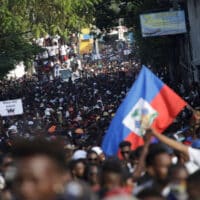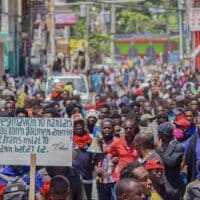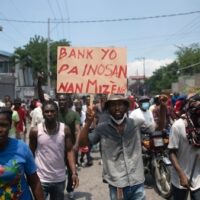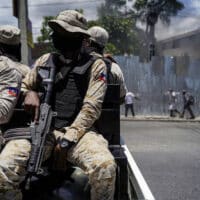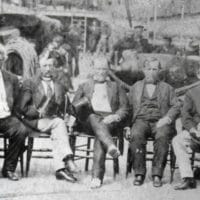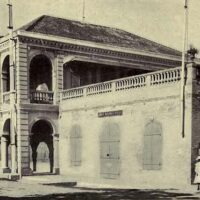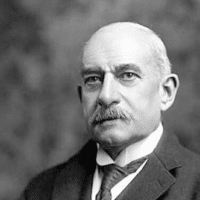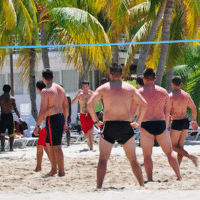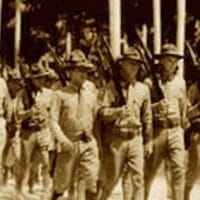-
Haitians intensify protests against foreign military intervention, while US seeks authorization for “international mission”
Citizens flooded the streets across Haiti in rejection of President Ariel Henry’s request for international military assistance, demanding that foreign powers stop interfering in Haiti
-
Four straight years of nonstop street protest in Haiti
In recent weeks, the streets of Haiti have once again been occupied by large marches and roadblocks. Banks and nongovernmental organizations (NGOs)–including Catholic charities–faced the wrath of the protesters who denounced U.S. interference in Haitian affairs.
-
Why does the United States continue to occupy a Haitian island?
The Americans mined a million tons of guano on the island without paying a cent to the Haitian authorities. Other countries have sold the product for hundreds of millions of dollars
-
Uprising targets Canada’s man in Haiti
A popular uprising has paralyzed life in much of Haiti. While police are violently suppressing protesters, don’t expect Canadian officials to criticize security forces they fund.
-
Canada supports oligarchic gangsterism in Haiti
Rosa Luxemburg popularized the dictum “Socialism or Barbarism”. Since World War I Leftists of various stripes have adopted or modified the maxim. In Haiti the struggle has been between those seeking “poverty with dignity” and oligarchic gangsterism. Unfortunately, Canada has been on the side of barbarism.
-
Cuba, Haiti, the Helms-Burton and the crime of insubordination
Empires never forgive rebels; an insubordinate rebel plants a seed that can sprout many generations later.
-
Imperialism and the weaponization of empathy
Scientists theorize that empathy developed as an evolutionary strategy to build stronger bonds among animals that depend on cooperation for survival.
-
The capitalist imperative driving cruel and bipartisan U.S. migration policies
Capitalism’s need for labor is the determining factor in immigration policy. Its contradictions create a system that is consistently inhumane.
-
Women in the Haitian Revolution
Black women in the French-speaking world have been marginalized throughout history and even if they did not lack autonomy within the family unit (which often they did), they certainly suffered as a result of their colonial status. This often created double oppression.
-
Frederick Douglass and American Empire in Haiti
Toward the end of his life, Frederick Douglass served briefly as U.S. ambassador to Haiti. The disastrous episode reveals much about the country’s long struggle for Black sovereignty while always under the threat of U.S. empire.
-
The curious case of Haitian pigs and Canadian imperialism
Pigs and Canadian imperialism. Most people would have difficulty understanding the connection. But for many Haitians the relationship is a historical memory.
-
Cages of Whiteness in the Shadow of Haiti: Guy Endore’s ‘Babouk’ and the Critique of Race-Class Alienation
Re-reading Guy Endore’s “forgotten masterpiece” it is striking how this novel from 1934, long-noted for its shocking and sophisticated account of slavery and resistance in the lead-up to the Haitian Revolution, is also a penetrating account of the ethical and political deformity and alienation perpetuated by the ideology of “whiteness.”
-
Heads roll as Biden policies move to the Right
The Washington Post has a piece on the current deportation of Haitian migrants from the U.S. and how it is charged with racism.
-
Borders, Blackness, and Empire
The spectacle of violence against Haitians at the U.S.-Mexico border needs to be seen in light of ongoing U.S. imperialism in Haiti.
-
How the U.S. came to dominate Haiti: seizing the gold
The Banque Nationale d’Haiti (BNH) was housed in a whitewashed, two-story colonial building at the corner of rues Ferou and Américaine in the downtown business district of Port-au-Prince.v
-
How the U.S. came to dominate Haiti: Part I – Dark Finance
The early history of U.S. imperial banking and the internationalization of Wall Street began alongside the project of U.S. colonial expansion at the turn of the 19th century and ended amid the financial and economic crises of the 1930s.
-
Imperialism and its discontents
On the night of 14 August 1791, enslaved Africans gathered in the Bois Caïman forest and planned the revolt that would begin the Haitian Revolution. Last week, on the 230th anniversary of this meeting, Haiti was hit by an earthquake that has upturned the lives of more than a million people.
-
Once again, the vultures circle Haiti
Joe Biden’s response to the earthquake was to put war hawk Samantha Power, who now heads USAID, in charge of U.S. relief efforts in Haiti.
-
DOCUMENT: James Weldon Johnson, Self-determining Haiti, 1920
Plan follows precedent of 1970s state-sponsored assassination campaign targeting leftists.
-
Haitian ruling families create and kill monsters
In March, hundreds of thousands of Haitians took to the streets of Port au Prince to demand an end to corruption and the departure of President Jovenel Moïse, whose term of office had expired.

